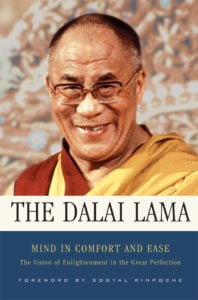The following is an excerpt from Mind in Comfort and Ease by His Holiness the Dalai Lama.
During the course of my life, on account of my training in the Buddhist teachings, I have gained some experiential understanding; I have thought a lot about these topics, and this is what I would like to share with you. However, if, as I speak, I relate my experience to the Buddhist teachings, it is not in order to propagate Buddhism. That is not my intention, not even in the slightest. I have reasons for this.
First, among human beings there is an enormous variety of mentalities and interests, and over the last three to four thousand years, numerous great religious and spiritual traditions have flourished on earth.
Many of them are still alive and active on the planet. Throughout their history, they have served the spiritual needs of millions of people. They still do so and will certainly continue to do so in the future. If, on account of our diverse capacities and inclinations, there are these different spiritual traditions with their individual views and philosophies, it can only be of immense benefit to the individual. This is why I feel convinced that people who adhere to the spiritual tradition of their parents, and live according to its view and philosophy, will find that it suits them very well.
Second, while the spiritual traditions of the world do have different views and philosophies, whatever their differences—and some of them are quite major—we find that the ethical training is mostly the same. For example, when it comes to cultivating love, compassion, patience, and contentment, or the observance of self-discipline and ethical principles, most spiritual traditions seem to be more or less the same. This is why I feel that, from the point of view of their potential to benefit people and help them develop into good human beings, most spiritual traditions are indeed the same, and this remains my firm conviction. This is a good reason for staying with the religion we have inherited from our parents.
"From the point of view of training the mind, all spiritual traditions are more or less the same and possess this same potential."
Otherwise, changing one’s religion is a serious matter and can be problematic; in some cases it can lead to real difficulties. Whenever I give talks in Western countries to people of different religious backgrounds and I explain the Buddhist teachings, my aim is never to proselytize on behalf of Buddhism. In fact, from time to time, I do have slight misgivings about teaching Buddhism in the West. Why? Because in these countries there are already established spiritual traditions, whether Christian, Jewish, or Muslim. If someone appears and talks about something like Buddhism, in certain cases it may cause people to have doubts about their own faith that they never had before. That is why I feel a little uneasy and apprehensive.
As for the spiritual traditions and religions that do exist around the world, two dimensions or aspects can be discerned. One aspect consists of the metaphysical or philosophical views. The other aspect comprises the precepts we need to follow in order to put these views into practice. This means the regular practice of training the mind, day by day, together with the appropriate kind of speech and physical behavior that go along with it. I believe that the major faith traditions generally exhibit these two aspects.
Sometimes you might wonder: What is the point of having such a diversity of metaphysical views and philosophies? Their aim is to tame this mind of ours and help us develop into good human beings. From the point of view of training the mind, all spiritual traditions are more or less the same and possess this same potential. It is only when we discuss them from the standpoint of the views and philosophies themselves that their differences stand out.
 Blending the highest wisdom with the deepest compassion and humanity, Mind in Comfort and Ease offers a glimpse into the Dalai Lama’s wisdom mind and a panoramic view of the Buddhist path. Here, in a teaching of outstanding completeness and clarity, the Dalai Lama sets out the key principles of Buddhism, showing how the mind can be transformed, and suffering overcome, through love, compassion, and a true understanding of the nature of reality. By illustrating his brilliant overview of the path with his own personal experiences and advice on how to integrate the practice, the Dalai Lama brings these teachings to life.
Blending the highest wisdom with the deepest compassion and humanity, Mind in Comfort and Ease offers a glimpse into the Dalai Lama’s wisdom mind and a panoramic view of the Buddhist path. Here, in a teaching of outstanding completeness and clarity, the Dalai Lama sets out the key principles of Buddhism, showing how the mind can be transformed, and suffering overcome, through love, compassion, and a true understanding of the nature of reality. By illustrating his brilliant overview of the path with his own personal experiences and advice on how to integrate the practice, the Dalai Lama brings these teachings to life.
| There are no products in your cart. |


